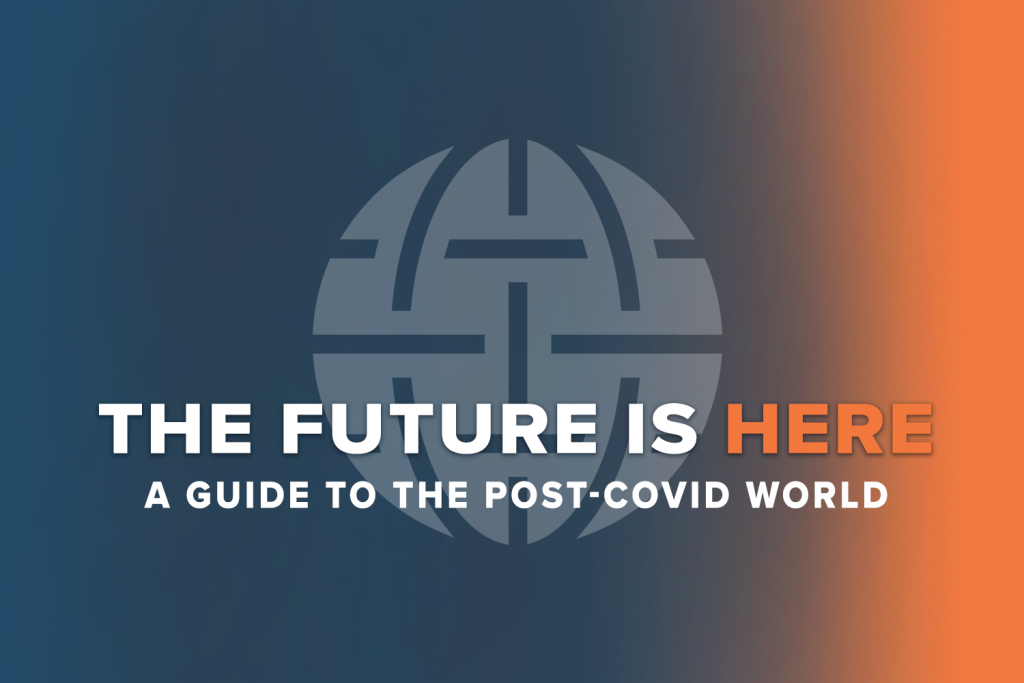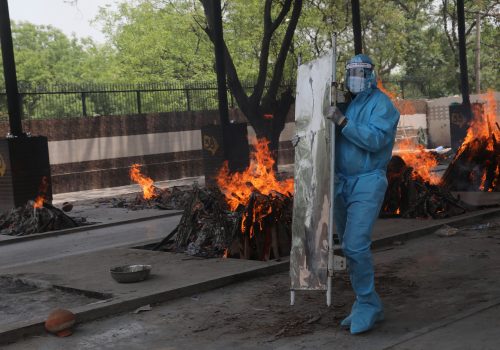The future is here: A guide to the post-COVID world 05/28/2021
Welcome to your guide to where the world is headed during the pandemic era and beyond, from Andrew Marshall. Each week, we’ll bring you the latest and most significant expert insights and international news about how coronavirus is reshaping international affairs. To stay updated each week, sign up to the newsletter here.
Let’s take a spin around the globe, in seven minutes or less.
In top stories this week:
- New hopes, and new fears, in India.
- Who wants to be a vaccine millionaire?
- A quest for answers about the virus’s origins.
- But first…
The big story
This week’s key theme: Vaccination campaigns will need to choose their words wisely.
What works best to persuade people to get a COVID-19 vaccine? Appealing to their community spirit or to their self-interest? Both approaches are underway in the United States right now.
There has been an explosion of research on such questions in the past year-and-a-half, as behavioral and social scientists have sought to understand and shape how people react to the pandemic. The journal Nature has a great synopsis.
One of the key focus areas: What makes people adopt preventive measures like masking? A sense of national or social solidarity helps, according to Jay Van Bavel, associate professor of psychology at New York University. “Van Bavel and his colleagues showed that countries in which people were most in favor of precautionary measures tended to be those that fostered a sense of public unity and cohesion,” says Nature. A sense that “we’re all in this together.”
This has long been a mainstay of public communication at times of war or crisis. And that is what you see in the campaign from the US Department of Health and Human Services to encourage vaccination, with the tagline, “We can do this.”
“We need you. We need you to bring it home,” said President Joe Biden, launching the campaign. “Get vaccinated. In two months, let’s celebrate our independence as a nation and our independence from this virus.” We, our, let’s. This is the language of much advocacy.
There is a problem, though; it doesn’t work for many Americans. It reflects collectivist values that simply don’t resonate with them. On average, vaccination rates are lower in counties and states that voted for Biden’s opponent, Donald Trump, who previously expressed his skepticism for vaccines. And studies showed that, worldwide, mask wearing was associated with collectivist culture, and mask refusal with a culture of individualism.
A parallel public messaging effort has come from the Ad Council, a nonprofit that produces advertisements that aim to tackle social problems, and it has resulted in a very different, more individualistic message: “It’s up to you.”
It has focused on the part of the population that is neither enthusiastic about nor firmly against COVID-19 vaccines. “About 40 percent of the country made up the middle and had expressed on surveys that they were ‘open but uncertain’ or ‘skeptical.’ To have the greatest impact, the Ad Council’s campaign had to focus on them,” says the Washington Post.
The campaign may have just expertly hit the mark. “No one is telling you to get a vaccine the way they were telling you to wear a mask,” adds the Washington Post. “At the same time, the phrase carries a subtext of implied responsibility: It’s up to you to ask questions and get answers. It’s up to you to get back to the moments you miss.” This, quite different from the federal campaign, has an “overall approach of encouraging questions and respecting people’s personal autonomy and freedom.”
This framing will also likely work with those concerned about the health risks. “In the approximately 10% of the population who are strongly hesitant about COVID-19 vaccines, provision of information on personal benefit reduces hesitancy to a greater extent than information on collective benefits,” says a study in the journal The Lancet. “Where perception of risk from vaccines is most salient, decision making becomes centered on the personal.”
“Emphasize ‘protecting myself, loved ones and those in my community’ (rather than ‘coming together as a nation’),” says the Ad Council messaging. “Acknowledge that the ‘choice is yours to make,’ which connects with the deeply rooted American value of liberty.”
Both campaigns are currently running in the United States—the “me” and the “we.” The country needs both first person singular and plural, it turns out.
Subscribe to The future is here: A guide to the post-COVID world
Sign up for a weekly roundup of top expert insights and international news about how coronavirus is reshaping international affairs.

The world in brief
Insights from across the planet, in ten bullets or fewer
- The COVID-19 wave in India subsides, while a different wave arises: India’s terrible wave of coronavirus infections and deaths seems to be slowing. On Monday, cases fell below 200,000 for the first time in more than a month. “Experts believe that at a national level, the wave is waning,” the BBC reported. “It appears to have crested in states such as Maharashtra, Delhi and Chhattisgarh, but is still rising in Tamil Nadu, for example, as in much of the north east.” And the country’s plight continues to spark calls for assistance. “Other countries must help India comprehensively control COVID-19 and ensure that further dangerous variants don’t emerge,” writes Ramanan Laxminarayan, an economist and an epidemiologist, in Foreign Affairs. Even patients who are recovering from the disease are facing a new challenge: black fungus. The Associated Press reports a worrying surge in the often-fatal mucormycosis, which might be exacerbated by doctors overprescribing steroids to COVID-19 patients.
- A global recovery takes shape: The global economy is recovering—unevenly, and somewhat unpredictably. “Advanced economies are enjoying a stronger recovery than we expected a few months ago,” the Financial Times reports. “This silver lining stems from an improving outlook for health, the power of government insurance which protected incomes during lockdowns and central banks facilitating cheap government borrowing.” Which parts of the world are booming? “The recovery currently looks like it will be stronger in the US, China, and the Asian emerging markets that are part of Chinese global supply chains,” writes economist Nouriel Roubini in the Guardian.
- The Treasury needs more money: US Treasury Secretary Janet Yellen warned that her department would need more resources to continue to administer relief packages. Testifying in Congress, Yellen “expressed confidence that the end of the pandemic recession was in sight, but said that the Treasury Department is facing an overwhelming task in disbursing hundreds of billions of dollars of relief money with the same budget that it had a decade ago,” the New York Times reported.
- Incentives help vaccination effort: New efforts to make the vaccine-hesitant get the jab are paying off. “Interest in getting vaccinated against COVID-19 increased right after Dr. Rochelle Walensky, director of the US Centers for Disease Control and Prevention, announced two weeks ago that vaccinated people could take off their masks,” CNN reports. Some states, including Ohio, are also offering lottery prizes to the vaccinated. “The success of incentives in an era of the coronavirus remains relatively unknown, and the flashy draw of $1 million campaigns has stirred intense debate among politicians, economists and health officials,” reports the New York Times.
- White House asks for more intelligence: Biden asked US intelligence agencies to gather more information on the origins of the COVID-19 pandemic and report back within ninety days, amid uncertainty about whether it arose from a lab accident or a jump from one species to another in the wild. The New York Times reports that the new White House urgency comes after intelligence officials said they had “a raft of still-unexamined evidence that required additional computer analysis.” As the Economist commented: “How can the world prepare for a future pandemic when it does not know for sure where the current one came from?”
The inside scoop
Insights from the Atlantic Council
Andrew Marshall is the Vice President of Communications for the Atlantic Council. He leads the Council’s media, digital, and editorial efforts, and coordinates the way the Council talks with its key communities.


